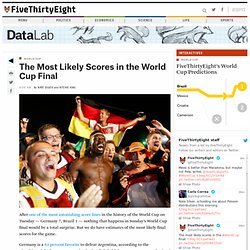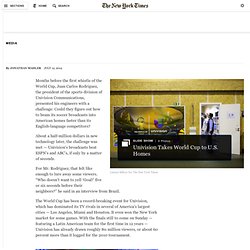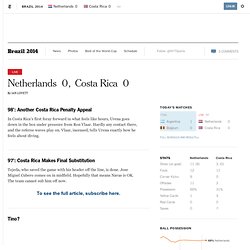

World Cup 2014 review: 64 memories from 64 matches in Brazil. 1) Brazil 3-1 Croatia, Group A Brazil kick off the World Cup and enjoy home advantage.

Brazilian newspaper thanks ref who rewarded Fred's dive: pic.twitter.com/HLJiIzTvbL— Deadspin (@Deadspin) June 13, 2014 2) Mexico 1-0 Cameroon, Group A Mexico finally win after having two goals disallowed. Mexico head coach Miguel Herrera is not pleased #WorldCup #MEXvsCMR pic.twitter.com/pABjCGa2UU— HuffPost Sports (@HuffPostSports) June 13, 2014 3) Spain 1-5 Holland, Group B Robin van Persie takes off as Spain crash to defeat against Holland.
Robin Van Persie in Gravity. pic.twitter.com/jJr6Fa82nv— RealGM Soccer (@RealGMSoccer) June 14, 2014 4) Chile 3-1 Australia, Group B Chile break down Australia and the referee unleashes his spray. 5) Colombia 3-0 Greece, Group C. #BBCtrending: Social media reaction to #WorldCupFinal. 13 July 2014Last updated at 23:00 ET By BBC Trending What's popular and why Bastian Schweinsteiger and Lukas Podolski of Germany celebrate with the World Cup trophy The World Cup 2014 final has broken social media records on Facebook.

The match between Germany and Argentina generated the highest level of conversation on Facebook for a single sporting event in history. 88 million people had more than 280 million interactions on the platform during the game. That's even bigger than last year's Super Bowl which resulted in 245 million interactions. On Twitter, it wasn't quite the biggest game in history. World Cup 2014 - Germany vs. Argentina. Best of the World Cup. The Most Likely Scores in the World Cup Final. After one of the most astonishing score lines in the history of the World Cup on Tuesday — Germany 7, Brazil 1 — nothing that happens in Sunday’s World Cup final would be a total surprise.

But we do have estimates of the most likely final scores for the game. Germany is a 63 percent favorite to defeat Argentina, according to the FiveThirtyEight forecast. Argentina had a slightly higher Soccer Power Index (SPI) rating when the tournament began, but Germany has seen its rating rise, particularly after its thrashing of Brazil, and it now ranks No. 1 by some margin. Betting lines also have Germany favored. The SPI match predictor allows us to predict the number of goals scored and allowed for each club. There are a couple of problems with this — for one thing, a team cannot score seven-tenths of a goal. Biggest Scorer in World Cup? Maybe Univision. Months before the first whistle of the World Cup, Juan Carlos Rodriguez, the president of the sports division of Univision Communications, presented his engineers with a challenge: Could they figure out how to beam its soccer broadcasts into American homes faster than its English-language competitors?

About a half-million dollars in new technology later, the challenge was met — Univision’s broadcasts beat ESPN’s and ABC’s, if only by a matter of seconds. For Mr. Rodriguez, that felt like enough to lure away some viewers. “Who doesn’t want to yell ‘Goal!’ El ‘big data’ llega al fútbol. Cada vez son más lo que perciben en Estados Unidos el fútbol casi como si fuera una práctica empírica, alejada de la apasionada variabilidad.

Tras hacerse un hueco en el mundo de las empresas, la política y los principales deportes estadounidenses, el creciente interés por el big data ha llegado al soccer y puede revolucionar a nivel mundial el modo de tomar decisiones de los entrenadores. Mediante un sinfín de estadísticas en bruto, hay expertos que analizan absolutamente cada detalle de un partido de fútbol, desde los más clásicos -como los goles, los pases acertados o las tarjetas- hasta otros mucho más elaborados -cada cuántos disparos a puerta acaban en gol, la distancia desde la que se efectúan o el grado de dependencia que tiene un jugador de las asistencias de sus compañeros de equipo para lograr marcar.
FIFA 2014 Unknown Facts. The World’s Ball. Data (TwitterData) Anatomy of a drubbing: How and why Brazil were annihilated by Germany. Germany’s Five First-Half Goals Against Brazil. Las coberturas más creativas del Mundial de Brasil: nuevas narrativas y reformulación de géneros periodísticos. La cobertura del Mundial de fútbol de Brasil que están realizando muchos medios internacionales pone de manifiesto que el trabajo del periodista para informar de este tipo de eventos ha cambiado para siempre.

En un momento en el que la audiencia de los programas y espacios deportivos, especialmente con motivo de las grandes citas, sigue creciendo, gran parte de los nuevos usuarios llegan a través de teléfonos inteligentes y tabletas, lo que está exigiendo un replanteamiento periodístico a la hora de contar historias y mostrar resultados adaptando sus formatos y géneros a los nuevos hábitos y soportes. El periodismo tiene, por tanto, el reto de involucrar a los usuarios móviles. Del 'digital first' hemos pasado al 'mobile first'. Las últimas noticias corroboran esta tendencia. Statkeepers Call the Shots, But They Can’t Agree on Them.
In the third minute of added extra time in Tuesday’s Belgium-U.S.

World Cup match, Belgium’s Kevin De Bruyne took a pass in the box, dribbled to his right and hooked the ball into the left side of the net. Finally, after 31 shots, the Belgians had broken through. Or … wait. Was it 32 shots? It depends on which Twitter account you follow. Netherlands 0, Costa Rica 0. What a finish!

After a slow, cagey first half, the game roared to life in the second half. As the Costa Ricans, who played much of their 120-minute battle against Greece with just 10 men, began to tire, the Netherlands piled on more and more pressure. Robben abused every defender who tried to mark him, repeatedly running past them, getting fouled (or, sometimes, just flinging himself to the ground) and winning free kicks in dangerous positions. In the final few minutes, Los Ticos were just desperately trying to keep the game scoreless — and somehow managed to do it, thanks to a shocking miss from van Persie, a great save from Navas, bad luck for Sneijder (who hit the post), and an amazing clearance off the line by Tejeda. Tim Howard's record-breaking display in USA's World Cup defeat to Belgium – in pictures.
Lionel Messi Is Impossible. In their Group F World Cup match late last month, Argentina and Iran were still deadlocked after 90 minutes.

With the game in stoppage time and the score tied at 0-0, Lionel Messi took the ball near the right corner of the penalty area, held it for a moment, then broke left, found his seam, took his strike and curled it in from 29 yards. What was going to be a draw was now a win, and Messi had put Argentina into the Round of 16. It was the sort of play that inspired the phrase “Messi magic.” But for those who only watch soccer when the World Cup rolls around, this was probably only the second (or at most third) goal they’d seen from the little man they call La Pulga (“The Flea”). Despite having 407 career goals in club and international play (including a record 91 in 2012 alone) and a record four Ballon d’Or (World Player of the Year) awards, until this year’s tournament, Messi hadn’t scored in a World Cup match since 2006.
Perhaps this year will be different. Scoring. Lionel Messi Is Impossible. Las coberturas más creativas del Mundial de Brasil: nuevas narrativas y reformulación de géneros periodísticos. Redesigning The World Cup 2014 Brazil. Mundial Brasil 2014: tots els partits i classificacions - Ara.cat. World Cup 2014 Predictions and Results. How the match played out on Twitter powered by CartoDB. The Clubs That Connect The World Cup. F.C. Internazionale Milano - Sito Ufficiale. The History of the World Cup in 20 Charts. Brazil, the World Cup host and the clear favorite (in our view), will start off the tournament Thursday with a match against Croatia.

Soon after, 30 other countries will take to the pitch with varying prospects of achieving their World Cup dreams. See the FiveThirtyEight World Cup predictions for more on that. But first: a brief tour of World Cup history. We wanted to answer a few basic questions: How often do favorites win? How often do host nations win? The 20 charts below provide some answers. These Elo ratings, which were adopted from a system developed for chess, have relatively little meaning in an absolute sense. The Elo system is set up such that the average team has a rating of 1500. Spot the Ball: The Best of Opening Weekend. The Best of Opening Weekend June 17, 2014. #GHAvsUSA: How USA v Ghana played out on Twitter. S World Cup Predictions. Where To Watch The World Cup In NYC, Depending On The Country You're Cheering For (MAP) More than a third of New York City residents were born in another country.
New York City after all, truly is a city of the world, which makes it the perfect place to watch the world's game this month during the 2014 World Cup in Brazil. Given New York City's multicultural makeup, fans can actually choose their viewing spot based on their national rooting interest. Watch the Brazilian national team while drinking caipirinhas at Miss Favela in Brooklyn. 2014 Football Championship in Brazil. 2nd ecran - BRESIL - CROATIE : Victoire difficile du Brésil (3-1) La Copa Mundial de los Tweets. Copa Mundial de la FIFA Brasil 2014: Actividad Social. The Huffington Post. 7 ejemplos de nuevas narrativas en los medios de comunicación. El reportaje multimedia Snow Fall marcó un hito en la forma de explicar historias en los medios digitales Entre commemoraciones, eventos deportivos que empiezan y estadísticas nuevas, los medios de comunicación parece que al fin han encontrado formas efectivas para la visualización de datos.
It’s World Cup time: Here’s how 8 news orgs will tackle the world’s biggest sporting event online. The wait is finally over. After a grueling three-year qualification process, the World Cup starts today in Brazil. While the 32 finalists have been hard at work training for the tournament, news organizations have also been busy preparing to cover the monthlong soccer tournament that is the largest sporting event on the planet. So as Brazil and Croatia prepare to take the pitch this evening, and as journalists continue to arrive in Brazil, here is a sampling of how some American news organizations are tackling the big event — one that, unlike recent Cups, will take place on a roughly North American schedule.
First, the full-time sports guys.